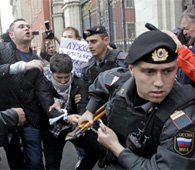Last Sunday, the Russian city of St. Petersburg, the country's second-largest and by far the country’s most important tourist attraction, became the fourth city to ban "homosexual propaganda."

According to the RIA Novosti news agency, St. Petersburg’s Governor Georgy Poltavchenko on Mar 11 signed off a law penalising "the propaganda of homosexuality and pedophilia among minors."
The law further defines propaganda of homosexuality as “the targeted and uncontrolled dissemination of generally accessible information capable of harming the health and moral and spiritual development of minors,” particularly that which could create “a distorted impression” of “marital relations.”
Passed in the third and final reading by the city’s Legislative Assembly in late February, the law imposes fines of up to 5,000 roubles (US$170) on individuals and up to 500,000 roubles (US$17,000) on legal entities for the promotion of homosexual, lesbian, bisexual, and transgender practices among minors.
The new legislation follows similar bans in the southern Astrakhan and central Ryazan and Kostroma regions in Russia, and effectively outlaws any gay pride events.
Attempts in recent years to hold gay rights rallies have been met with contempt and outright hostility from officials, nationalist and religious groups, and have occasionally turned violent. Observers say the issue has gradually begun to attract the attention of international and Russian news media, including government-controlled television, which has occasionally given a platform to advocates of equal rights for gay people.
In 2010 the European Court of Human Rights fined Russia for banning homosexual parades in Moscow, in what gay rights activists described as a historic victory.
An International Herald Tribune blog notes: "What would fall under the definition of this law? Any book or periodical that contains, say, a mention of same-sex marriage or a same-sex relationship — unless the book or periodical is sold at an adults-only bookstore. Public displays of affection among same-sex couples would also be an offense. For gay or lesbian parents, simply living with their children might be a breach."
LGBT rights group in Russia have condemned the far-reaching law that would restrict advocacy work. ComingOut said that gay organisations could face heavy fines for spreading "homosexual propaganda."
"This law would legalise discrimination against gays and lesbians in Russia," the group said in a statement. "The history of Europe shows that all totalitarian regimes here began with similar repression of LGBT people. If this law is allowed to pass, it could signal that Russia is sliding towards a new totalitarianism."
The head of the Russian LGBT Network, Igor Kochetkov, also slammed the legislation. "You can also adopt a law against turning off the light of the sun, but no one has the ability to do this," Kochetkov said. "Even if someone wanted to, no amount of propaganda is going to turn a heterosexual gay."
"This is a law that can be used, and will be used, to conduct searches of organisations and prevent public actions," he added. "Most importantly, it will be used for official propaganda. Officially homosexuality will be considered illegal, something incorrect and something that cannot be discussed with children. It will create a negative atmosphere in society around gays and lesbians as well as our organisations."
The group GayRussia has appealed to the EU, USA, Canada, Australia, France and Germany “to impose bans on entries to these countries for Vitaly Milonov, the author of the scandalous ‘anti-gay law’ and Georgy Poltavchenko, St. Petersburg governor who adopted the law by signing the final draft.”
“Milonov and Poltavchenko have disgraced Russia all over the world. They have turned our country and its ‘culture capital’ into the medieval barbaric times, what that means is that there is no place for them in the contemporary civilised countries. Milonov and Poltavchenko do not share the values of democracy, freedom and human rights. They cannot be allowed to spread their homophobic views abroad,” the group wrote in an open letter to the EU.
The European Union has already adopted a resolution “strongly” condemning the law while the Canadian government has lodged an official protest, as well as issuing a travel advisory.
- All Out: Take a stand for Russia
- Kaleidoscope: act now to support the campaign against Russian anti-gay laws











 列印版本
列印版本











讀者回應
請先登入再使用此功能。